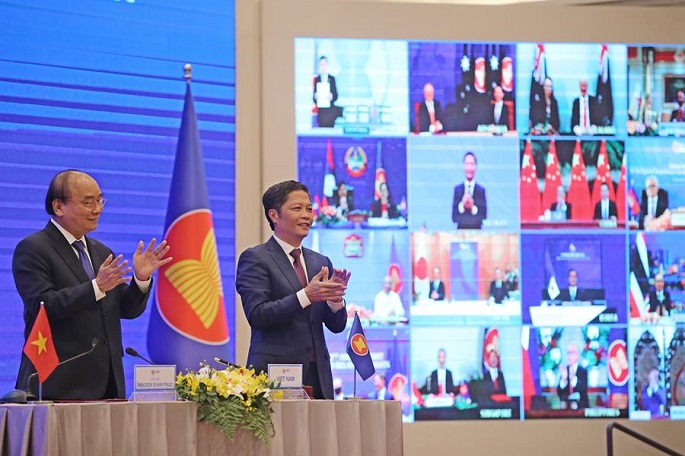15 Asia-Pacific nations sign world's largest trade deal
Published : 15 Nov 2020, 18:18
The representatives of 15 countries of the Asia-Pacific signed Sunday the Regional Comprehensive Economic Partnership (RCEP), the world's largest free trade agreement, with China at the forefront.
The agreement, which comes after eight years of negotiations, was signed virtually due to the Covid-19 pandemic, and also includes Japan, South Korea, Australia and New Zealand in addition to the 10 countries of the Association of Southeast Asian Nations (ASEAN).
The treaty, which does not include the United States, would account for a third of the global economy and a market of about 2.3 billion people.
The agreement was signed on the sidelines of the summit of ASEAN countries, made up of Myanmar, Brunei, Cambodia, the Philippines, Indonesia, Laos, Malaysia, Singapore, Thailand and Vietnam, which began Thursday and concluded Sunday.
The negotiations for the RCEP began in 2012 as an initiative of the ASEAN with those countries with which it already had free trade agreements (FTA), namely Australia, China, South Korea, Japan, India and New Zealand.
Many see it as a coup for Beijing, which can frame the deal as an antipode to the protectionism of Donald Trump’s US.
Trump pulled the US out of the Trans-Pacific Partnership (TPP) shortly after taking office.
"The signing of the RCEP is not only a success for regional cooperation in the East Asia region, but it is also a victory for multilateralism and free trade,” Li Keqiang, the Chinese premier, said.
India decided not to be a part of the agreement last year over fears of its market being flooded with cheaper products, mainly from China.
This agreement will lower tariffs by up to 90 percent and address issues such as the digital economy, investment and intellectual property, although it does not contain regulations on labour rights and the environment.
Several experts think the treaty will help the rejuvenation of the economy following the impact of the Covid-19 pandemic on countries in the region.
However, some non-governmental organizations have criticized the RCEP for prioritizing the interests of multinationals and leaving small producers unprotected, mainly in the agricultural sector.
"The entire RCEP negotiation process has been an affront to democracy," ASEAN Parliamentarians for Human Rights member and politician from the Philippines, Sara Elago, said in a statement.
Elago stated that the governments have favored large companies and negotiated the treaty in an opaque, without consultation with citizens and the supervision of their respective parliaments.


